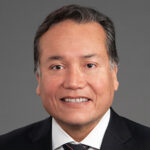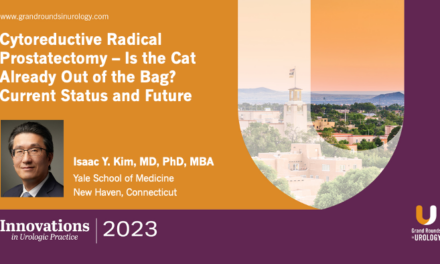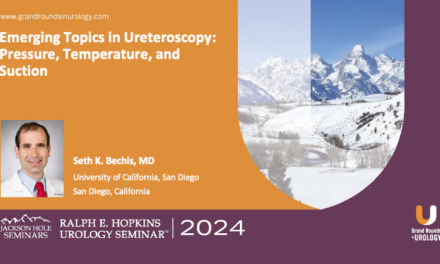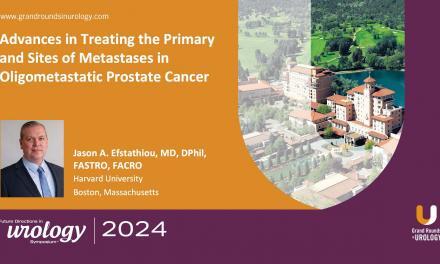Alejandro R. Rodriguez, MD, presented “Bladder Cancer: Optimizing Detection and Minimally-Invasive Management” at the 11th Urology Today conference on October 27, 2023.
This content is available free to the GRU Community. Login or create an account to view it.
How to cite: Rodriguez, Alejandro R. “Bladder Cancer: Optimizing Detection and Minimally-Invasive Management.” October 2023. Accessed Nov 2025. https://grandroundsinurology.com/bladder-cancer-optimizing-detection-and-minimally-invasive-management/
Bladder Cancer: Optimizing Detection and Minimally-Invasive Management – Summary
Alejandro R. Rodriguez, MD, discusses detection and minimally invasive management of bladder cancer. Dr. Rodriguez begins by noting that bladder cancer is the 10th most-commonly diagnosed cancer worldwide, and presents the American Urological Association (AUA) risk stratification that provides the basis for non-muscle-invasive bladder cancer (NMIBC) management.
Dr. Rodriguez notes that the most frequent treatment for NMIBC is Transurethral Resection of Bladder Tumor (TURBT.) While he contends that conventional TURBT is the best tool for clinical staging of NMIBC, he enumerates the risks and drawbacks of the procedure.
Dr. Rodriguez then describes narrow-band imaging (NBI) as an additional modality, and presents data showing that TURBT performed in NBI modality reduces NMIBC recurrence risk. Further, NBI with white light cystoscopy TURBT may lower recurrence risk with little-to-no effect on adverse event risks.
Finally, Dr. Rodriguez turns to the role of TUR in muscle-invasive bladder cancer (MIBC), with a focus on clinical staging, histology and grade, and bladder preservation options. He notes that trimodality therapy is the primary option for patients with MIBC that seek bladder preservation as an alternative to radical cystectomy.
About The 11th Urology Today Conference:
Presented by chair Ryan P. Terlecki, MD, FACS, the 11th Urology Today conference was designed to keep urologists, urologic oncologists, and other healthcare providers educated on the most pertinent issues in urology practices. Areas of focus included urologic oncology, men’s health and reconstruction, female urology, pediatric urology, kidney stones and related conditions, and methods of providing the best care amidst the required logistics of the business side of medicine.
For further educational activities from this conference, visit our collection page.
ABOUT THE AUTHOR
Alejandro Remigio Rodriguez, MD, is an associate professor and the Director of Minimally Invasive Surgery at Atrium Health Wake Forest Baptist Urology in Winston-Salem, North Carolina. Dr. Rodriguez specializes in urology, urologic oncology, and robotics. He performs robotic assisted surgery for the treatment of prostate cancer, kidney cancer, and bladder cancer, as well as any other malignant and benign diseases of the genitourinary system.
Dr. Rodriguez earned his medical degree from the Universidad Autonoma de Guadalajara in Mexico. He then completed residency training in Urology, and was Chief Resident at the University of South Florida in Tampa. Dr. Rodriguez then completed a fellowship in Urology and Oncology at Moffitt Cancer Center in Tampa, Florida. He completed a fellowship in Minimally Invasive Surgery at the Centre Hospitalier Universitaire de Rennes in Rennes, France.
Dr. Rodriguez is the present secretary general of the Confederación Americana de Urología and Editor of the American Urological Association News in Spanish. He is an honorary member of multiple urology societies, including the European Association of Urology. Dr Rodriguez has published over 200 peer-reviewed manuscripts and abstracts and has been an invited speaker in multiple national and international meetings.





